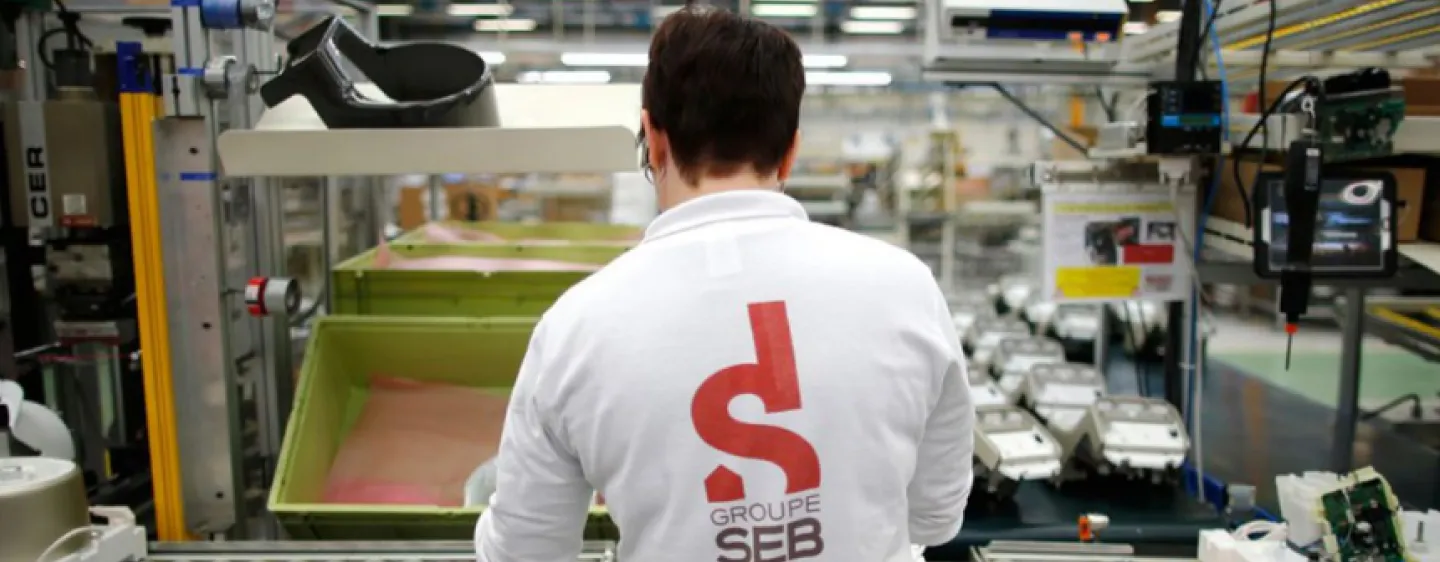

In 165 years of history, Groupe SEB has become the ideal household companion, transforming the daily lives of billions of consumers worldwide. It was built, little by little, through major innovations but also the acquisitions of major brands such as Tefal, Calor, Rowenta, Moulinex, Krups, Supor and WMF.
Born from a tinsmithery workshop created in 1857 by Antoine Lescure, carried on and developed by his descendants, Groupe SEB broadened its activities to cover all segments of the small domestic equipment sector, and to all continents to become the global standard in this area of business. Present in the kitchen, in home care, as well as linen and personal care, Groupe SEB benefits from a unique position in households and in the world of professional coffee machines.
It all started with a romance. Antoine Lescure, a modest tinker from Auvergne, falls under the spell of a beautiful woman from Burgundy (France) and sets up business in Selongey to start manufacturing his own tinware items. His son Jean, and then his grandson René, took over from him and industrialized production. Then, it was the turn of his great grandsons, Frédéric and Henri, to devise the strategy which, still today, makes the Groupe stand out: create interest in more robust, easier to handle and simpler products than rivals; manufacture them in series to reduce costs and develop the company with the earnings generated.
This is the start of a long family history, the Lescure family and SEB (Société d'Emboutissage de Bourgogne meaning Burgundy Press Company.)


In the 1950s, France aspires to modernity. The middle classes are expanding. Convenience is no longer considered a luxury, it has become essential, to save time and effort. SEB leverages the benefits of metal stamping, which it has fully mastered, to design a new generation of pressure cooker. In 1953, the SEB Super Cocotte pressure cooker is born. Safe, attractive, efficient, fast and robust, thousands of units are sold, boosting the company's reputation and opening up international markets to the Lescure brothers. At the same time, Emmanuel, Frédéric's son, introduces modern marketing and advertising methods.
In the 1960s, SEB turns a corner in its history, it must succeed in its growth challenge. The
company must strengthen its presence in the small domestic equipment market, while maintaining
the
culinary expertise on which its reputation is built. Therefore, it decides to penetrate the
small
domestic appliances market.
At the same time, it acquires two prestigious companies: Tefal in 1968 and Calor in 1972. These
acquisitions give the company the scale of a consolidated group. In 1973, SEB becomes Groupe
SEB,
with the creation of SEB SA and, two years later, the listing of the SEB share on the Paris
stock
market.
In 1976, chaired by Emmanuel Lescure, the Groupe transfers its headquarters from Selongey to
Ecully.


In the 1980s, the Groupe takes on a genuine international dimension with the acquisition of Germany company Rowenta (1988) which promotes it to the position of European leader for small domestic equipment. During the 1990s, the world changes dramatically: frontiers were overcome, markets opened up significantly with major expansion of middle classes in so-called "emerging" countries. With Jacques Gairard at the helm, the presence and reach of the Groupe changes scale: business is set up in Russia, the Middle East, Asia, South Africa, Oceania and South America - with notably the acquisition of Arno (1997), small domestic appliances leader in Brazil, and Volmo (1998), leader in Colombia and Venezuela.
In the 2000s, Thierry de La Tour d'Artaise becomes Chairman and CEO of the Groupe and finalizes the acquisition of Moulinex one year later. The Groupe becomes the global leader in small domestic equipment. At the time, the Groupe had to fight off intense competition from low-cost Asian products and reorganize its industrial base to remain competitive. At the same time, it rolled out its ambitious global strategy based on continued acquisitions, with the purchases of brands such as SUPOR (2007) in China, and German WMF (2016) leader in professional automatic coffee machines.


With such rapid expansion, the Groupe acquired leading- edge equipment to support its growth. Hence the construction of a new global headquarters in Ecully: the Campus SEB. Covering 6 hectares, the Campus is built around a series of modern and innovative buildings which reflect the values and ambitions of the Groupe, notably in terms of quality of life and sustainable development. Choice of materials, reduced energy consumption and enhanced thermal performance, respectful of biodiversity, local partnerships, inclusivity clauses... even the design and construction of its head office reflects the Groupe's responsible approach. Then, in 2021, Groupe SEB invests in the development and construction work for its Global Innovation Center based on the Campus SEB. Investments which facilitate the acceleration of new product development and launches.
In parallel, the Groupe continues to expand in the professional market with Wilbur Curtis from the US, and French company Krampouz, meaning crepe in Breton. And the Spanish Zummo, world leading producer of professional juicers. Development and strengthening leadership continue, translating the desire to guarantee the long-term viability of the Groupe. This also involves adjustments to its corporate governance. Since July 1, 2022, Stanislas de Gramont has been Chief Executive Officer of the Groupe and Thierry de La Tour d'Artaise remains its Chairman.
Today, Groupe products and services assist consumers in more than 150 countries and cover all areas of daily life: multi-function cooking food processors, cordless vacuum cleaners, automatic smart coffee machines, cookware, hair removal systems and the latest ironing systems!... The list of appliances is impressively long. Throughout its history, the Groupe has always succeeded in offering the right products and services at the right time.